For the most part, today’s feature- 1944’s British production of Hotel Reserve, gets fairly positive reviews from viewers. However, the more realistic perspective is that of lost opportunities. Although often compared to the style of [intlink id=”287″ type=”category”]Alfred Hitchcock[/intlink], Hotel Reserve comes up just a tad short in several key areas.
There is definitely potential here that, under Hitch’s direction, could have produced an outstanding picture. Sadly, I know of no picture with three directors which climbs successfully the pinnacle of greatness. The combined efforts here of Lance Comfort, Mutz Greenbaum, and Victor Hanbury are no exception.
But all is by no means lost.
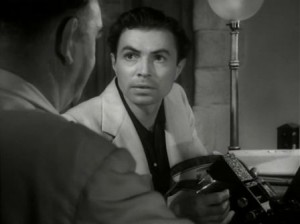 Coming from an original work by Eric Ambler, Hotel Reserve tells the story of a young Austrian émigré ([intlink id=”127″ type=”category”]James Mason[/intlink]) vacationing in the south of France awaiting the finalization of his naturalization papers entitling him to French citizenship. The time is just prior to the outbreak of World War II and Mason is holed up in a small seaside resort with a varied but stereotypical cast of fellow tenants.
Coming from an original work by Eric Ambler, Hotel Reserve tells the story of a young Austrian émigré ([intlink id=”127″ type=”category”]James Mason[/intlink]) vacationing in the south of France awaiting the finalization of his naturalization papers entitling him to French citizenship. The time is just prior to the outbreak of World War II and Mason is holed up in a small seaside resort with a varied but stereotypical cast of fellow tenants.
Mason is also an amateur photographer and unfortunately during his sojourns around the area gets his camera swapped with an identical one from another guest. On development the negatives reveal pictures as well of a French defense installation. Of course Mason is innocent and is ultimately sent back by the police to attempt to discern who the owner of the other camera is.
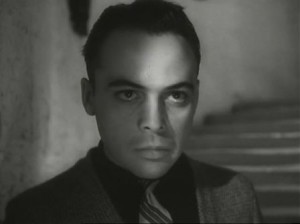 The balance of the guest roster of the hotel is uninteresting and most are indistinguishable from each other, with the sole exception of Andre Roux, played by a very young Herbert Lom. It isn’t a real surprise who the secret agent is but somehow through fits and starts a bit of suspense is created, though sadly a potentially climactic confrontation at the end is less than laudatory, in large part probably due to Lom’s relative inexperience at the time.
The balance of the guest roster of the hotel is uninteresting and most are indistinguishable from each other, with the sole exception of Andre Roux, played by a very young Herbert Lom. It isn’t a real surprise who the secret agent is but somehow through fits and starts a bit of suspense is created, though sadly a potentially climactic confrontation at the end is less than laudatory, in large part probably due to Lom’s relative inexperience at the time.
Mason is the main draw for this picture, and he is almost spritely in his beachwear and sandals. He is still learning his chops as well but carries the picture without a tremendous array of talent around him on- or off screen. Of course the voice is still there.
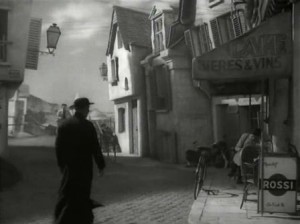 Typical of most British productions of the era, the cast is a bit thin and the production is preposterously set-heavy, though of course location filming in the south of France in 1944 would have been somewhat problematic. Pesky Germans and all.
Typical of most British productions of the era, the cast is a bit thin and the production is preposterously set-heavy, though of course location filming in the south of France in 1944 would have been somewhat problematic. Pesky Germans and all.
Perhaps the fatal defect of the film is the disjointed product on screen that the three directors piece together. Although not familiar with the original Eric Ambler work on which the film is based, surely the plot flows a bit better in the printed form. There is a dramatic swing from the beginning of the picture, when all is well and the theme focuses on vacationers at a scenic resort to the ending which is extremely gloomy centering on the looming war with Hitler. Nary do the two themes meet or transition as the former is basically dropped in favor of the latter. Presumably the change in theme and style mirror a change in director as well.
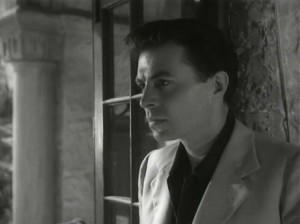 The other allure of Hotel Reserve is the tremendous score by relative unknown Lennox Berkeley. Berkeley scored only two features, with Hotel Reserve being his first. It is a sweeping score without being clichéd. Sadly, there are no recordings that I know of outside of the original feature release, so enjoy it as you can.
The other allure of Hotel Reserve is the tremendous score by relative unknown Lennox Berkeley. Berkeley scored only two features, with Hotel Reserve being his first. It is a sweeping score without being clichéd. Sadly, there are no recordings that I know of outside of the original feature release, so enjoy it as you can.
Sadly, like many other lesser films Hotel Reserve is not the easiest to find and rarely appears even on TCM. It has never been released on DVD- at least not officially in Region 1- and exists only in a rare VHS release.
Not a great film by any means, but worth a look if only for a young James Mason.
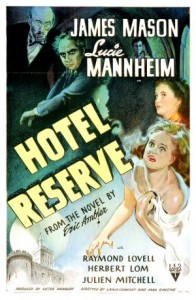
This is an awkward film, although it does have its moments. I could never decide if I liked James Mason in it or not. Anyway – you’ve posted a great review of an obscure film.